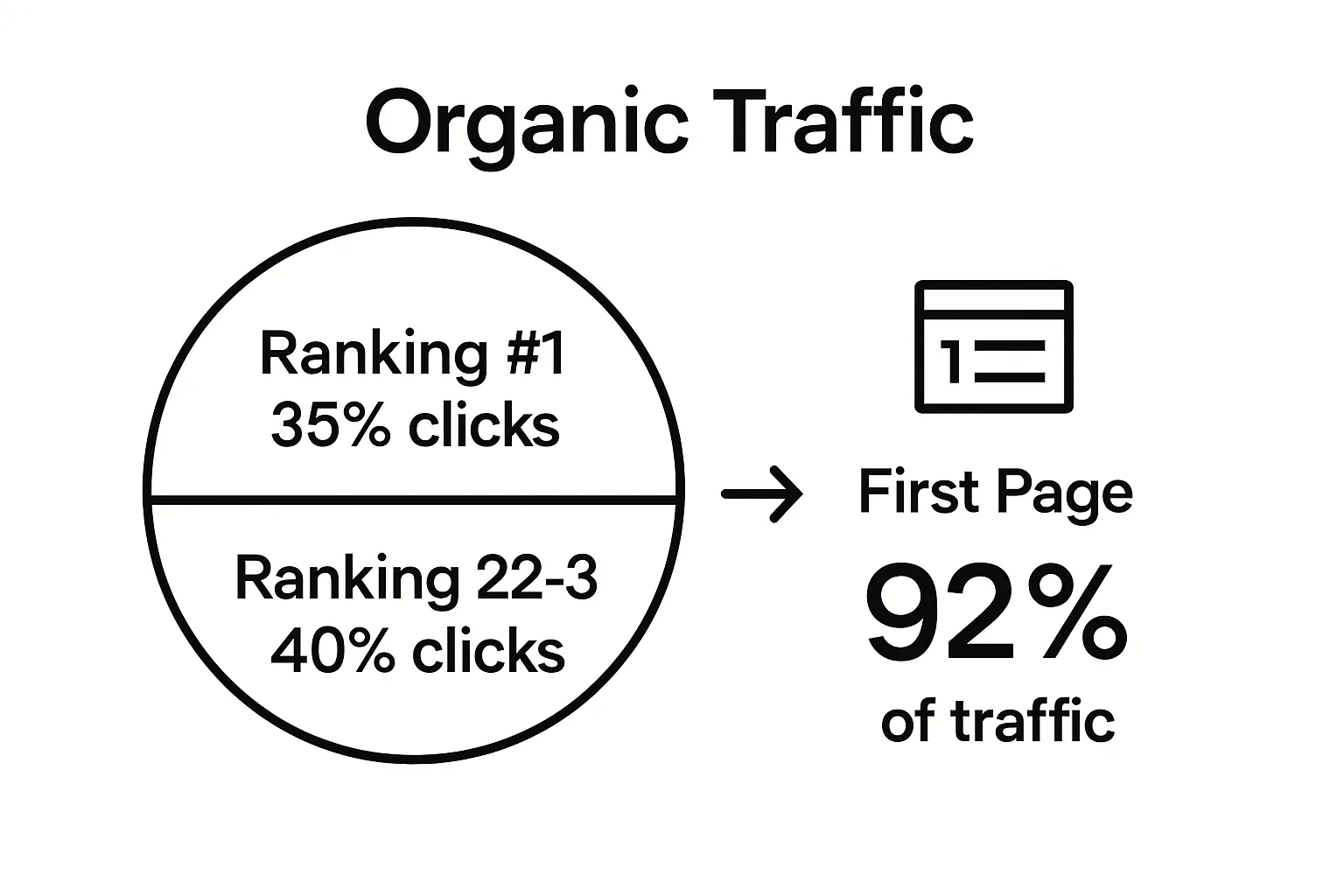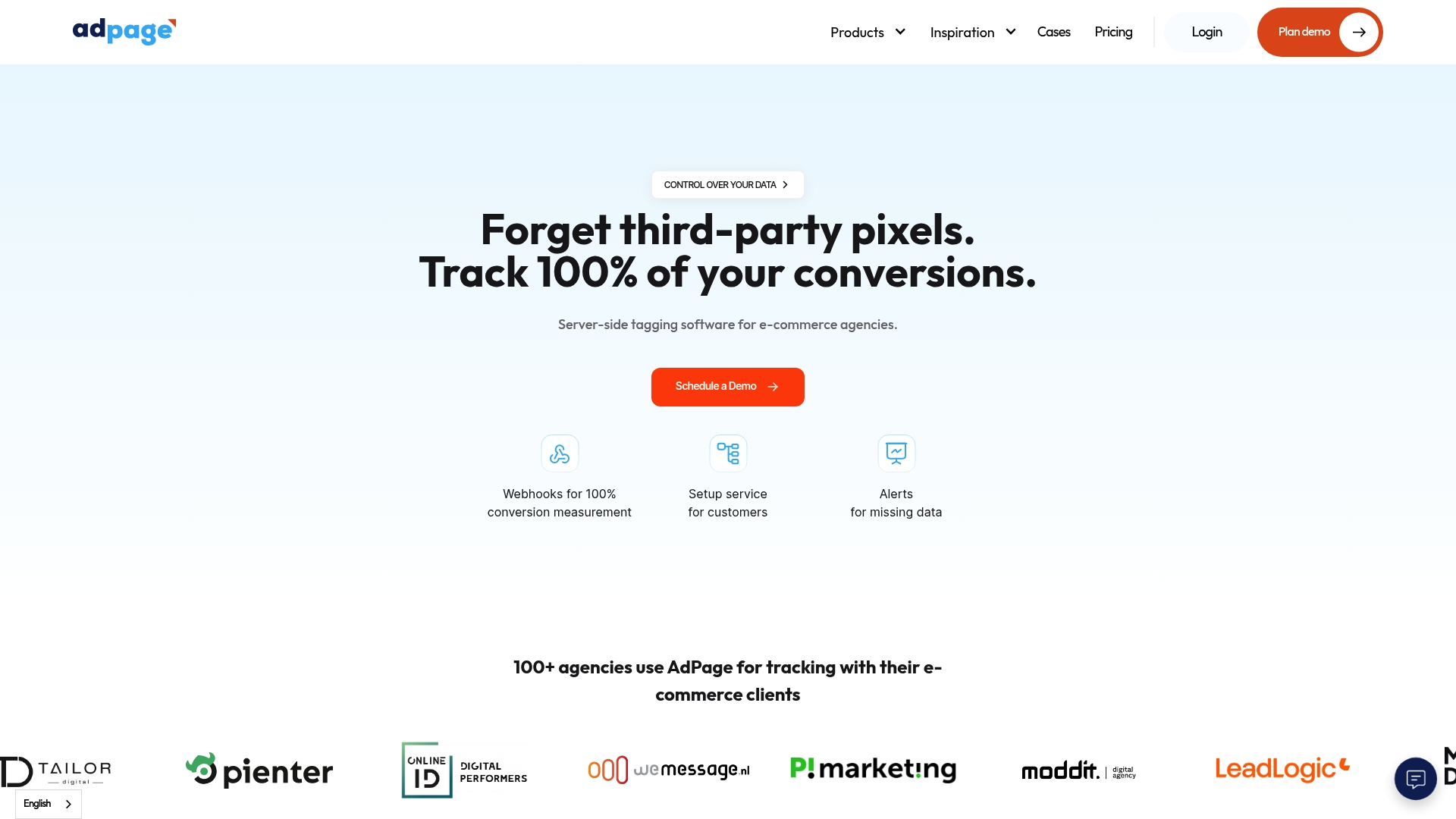Most people think SEO is all about tricking Google or stuffing a site with keywords, but the reality is much deeper. Turns out, websites on the first page capture nearly 92 percent of all search traffic. Surprising, right? Yet it is not the ranking that matters most, it is how well your site matches what real people are actually searching for that makes all the difference.
Tabla de contenido
- What Is Seo And Its Fundamental Principles?
- Why Is Seo Crucial For Online Businesses?
- How Seo Impacts Visibility And User Engagement
- Key Concepts And Components Of Effective Seo Strategies
Resumen rápido
| Llevar | Explicación |
|---|---|
| SEO enhances online visibility. | Proper SEO strategies significantly improve how websites appear in search results, leading to greater organic traffic. |
| Quality content is essential. | Creating high-quality, relevant content aligns with user intent, which is crucial for effective SEO. |
| Technical performance impacts rankings. | Factors like website speed and mobile responsiveness are vital for maintaining high search engine rankings. |
| User experience boosts engagement. | A seamless user experience increases interaction metrics, which positively influences SEO outcomes. |
| Investing in SEO is critical. | Businesses must adopt effective SEO practices to thrive in a competitive digital landscape and ensure long-term growth. |
What is SEO and its Fundamental Principles?
Search Engine Optimization (SEO) is a strategic digital marketing approach designed to improve a website’s visibility and ranking within search engine results pages. At its core, SEO involves systematically enhancing online content to attract more organic traffic and improve overall digital presence. Search Engine Journal defines this process as a comprehensive method of increasing both the quality and quantity of website traffic through non-paid search engine results.
Understanding SEO Mechanics
SEO operates through multiple interconnected mechanisms that help search engines understand, categorise, and rank web content. These mechanisms include:
- Technical website optimisation
- Content relevance and quality
- User experience signals
- External credibility factors
The primary goal is to align website content with search engine algorithms while simultaneously meeting user search intent. This means creating valuable, informative content that answers specific user queries effectively.
Key Components of Effective SEO
Successful SEO strategies incorporate several critical elements. Websites must focus on producing high-quality, original content that addresses specific user needs. This involves comprehensive keyword research, understanding target audience preferences, and creating content that provides genuine value.
Technical aspects are equally important. Website speed, mobile responsiveness, secure connections (HTTPS), and clean site architecture significantly influence search rankings. Search engines prioritise websites that offer seamless user experiences and load quickly across different devices.
External credibility, often established through high-quality backlinks from reputable websites, plays a crucial role in demonstrating a site’s authority. Search engines interpret these external references as indicators of content quality and relevance.
Below is a summary table outlining the key components and their roles within an effective SEO strategy, helping readers quickly grasp the pillars of successful optimisation.
| SEO Component | Descripción |
|---|---|
| Content Quality | Creating high-quality, original content that meets user needs and search intent |
| Technical Performance | Optimising site speed, mobile responsiveness, secure connections, and site architecture |
| User Experience | Providing seamless navigation and fast load times across all devices |
| Keyword Strategy | Conducting comprehensive research to align content with relevant search queries |
| External Credibility | Earning backlinks from reputable websites to establish authority |
| Metadata Optimisation | Enhancing titles and descriptions for better visibility in search results |
| Structured Data | Using markup to help search engines understand and display content effectively |
Why is SEO Crucial for Online Businesses?
SEO represents a fundamental strategy for businesses seeking sustainable digital growth and competitive advantage. McKinsey & Company highlights that businesses with robust digital strategies experience significantly higher customer engagement and revenue generation.
Driving Organic Traffic and Visibility
Online businesses rely on visibility to attract potential customers. SEO enables websites to appear prominently in search results, which directly translates into increased organic traffic. Websites ranking on the first page of search results capture approximately 92% of all search traffic, making high rankings crucial for business survival.
The following table highlights key SEO statistics mentioned in the article, providing a clear overview of the impact of effective optimisation on online visibility and business performance.
| SEO Statistic | Valor | Context/Explanation |
|---|---|---|
| First page search traffic share | 92% | Percentage of search traffic captured by websites on first page |
| Top three result click-through rate | 75% | Share of clicks received by top three search results |
| Engagement increase from optimisation | up to 60% | Reported higher user engagement on optimised platforms |
| Relative cost efficiency | Alta | SEO considered more cost-effective than paid advertising |
| Impact on long-term growth | Significant | SEO critical for sustainable business development |

Key benefits of effective SEO include:
- Improved website visibility
- Higher quality website traffic
- Enhanced brand credibility
- Cost-effective marketing strategy
Long-Term Business Growth Strategy
Unlike paid advertising, SEO provides sustainable, long-term value for businesses. By consistently producing high-quality, relevant content and optimising technical website elements, companies build enduring online presence. This approach not only attracts potential customers but also establishes brand authority within their industry.

Search engines continuously evolve their algorithms to prioritise user experience, meaning businesses must adapt their strategies accordingly. Investing in SEO is no longer optional but a critical component of digital marketing. Learn more about boosting online sales with strategic digital marketing to understand how SEO integrates with broader marketing objectives.
Businesses that neglect SEO risk becoming invisible in an increasingly competitive digital marketplace. By understanding and implementing effective SEO strategies, companies can transform their online presence, attract more qualified leads, and ultimately drive sustainable business growth.
How SEO Impacts Visibility and User Engagement
SEO fundamentally transforms how businesses connect with potential customers by bridging the gap between user intent and relevant online content. Forrester Research indicates that websites optimising their digital presence experience up to 60% higher user engagement rates compared to non-optimised platforms.
Enhancing Search Engine Visibility
Search engine visibility represents more than just appearing in results. It involves strategic positioning that captures user attention and drives meaningful interactions. Websites ranking within the top three search results receive approximately 75% of all click-through traffic, demonstrating the critical importance of robust SEO strategies.
Key aspects of visibility enhancement include:
- Precise keyword targeting
- Structured content architecture
- Metadata optimization
- Mobile-responsive design
User Experience and Engagement Metrics
Effective SEO goes beyond simple rankings. It directly influences user experience by ensuring content matches search intent, providing seamless navigation, and delivering valuable information quickly. Search engines reward websites that demonstrate strong user engagement through metrics like:
- Tiempo de permanencia en la página
- Lower bounce rates
- Multiple page views
- Higher interaction rates
These signals indicate content relevance and quality, which search algorithms use to determine ranking positions. Learn how to optimise product pages for better conversions to understand how technical optimization intersects with user engagement strategies.
By prioritising user-centric SEO approaches, businesses can create digital experiences that not only attract visitors but also encourage meaningful interactions, ultimately driving sustainable growth and customer loyalty.
Key Concepts and Components of Effective SEO Strategies
Successful SEO strategies require a comprehensive approach that integrates multiple technical and creative elements. Moz highlights that modern SEO goes far beyond simple keyword placement, encompassing a holistic digital marketing approach that addresses user experience, content quality, and technical performance.
Technical Foundation of SEO
The technical infrastructure of a website plays a crucial role in determining search engine rankings. Website performance directly impacts user engagement and search visibility. Critical technical elements include:
- Website loading speed
- Capacidad de respuesta móvil
- Secure hosting (HTTPS)
- Clean, crawlable site architecture
- Structured data markup
Search engines prioritise websites that provide seamless user experiences and demonstrate robust technical performance. This means investing in backend optimization is just as important as creating high-quality content.
Content and Keyword Strategy
Content remains the cornerstone of effective SEO strategies. Successful approaches focus on creating comprehensive, relevant content that directly addresses user intent. This involves:
-
Detailed keyword research
-
Understanding audience search patterns
-
Creating in-depth, original content
-
Matching content with specific user queries
Keyword optimization has evolved from simple density metrics to understanding semantic relationships and user intent. Modern SEO requires nuanced content that provides genuine value and answers user questions comprehensively. Explore our guide on digital marketing strategies for enhanced growth to understand how content strategy integrates with broader marketing objectives.
By combining technical excellence with strategic content creation, businesses can develop SEO approaches that not only improve search rankings but also deliver meaningful experiences to their target audiences.
Ready to Turn Your SEO Success Into Real Conversions?
You have invested in understanding the vital role of SEO for your business. Yet, even the best-optimised websites often struggle with incomplete conversion data, inaccurate tracking, or compliance worries. As discussed in this article, accurate measurement and actionable insights are essential for managing organic growth and staying ahead in the digital marketplace. If your current analytics miss critical touchpoints, your hard-earned SEO results may never convert to real growth.

Transform the way you track and optimise conversions with AdPage. Our server-side tagging and advanced consent management help you capture 100 percent of your conversions, eliminating the data loss and inefficiencies that can hold back your online business. Take the leap now and make every SEO effort count. Visit our platform to see how you can unlock higher conversion rates and data-driven decisions today.
Preguntas frecuentes
What is SEO and why is it important?
SEO, or Search Engine Optimization, is a digital marketing strategy that improves a website’s visibility in search engine results. It is vital for driving organic traffic, enhancing brand credibility, and ensuring long-term business growth.
How does SEO impact user engagement on a website?
Effective SEO directly influences user engagement by optimizing content to match search intent, ensuring seamless navigation, and providing valuable information quickly, which leads to increased interaction and lower bounce rates.
What are the key components of an effective SEO strategy?
An effective SEO strategy includes high-quality and relevant content, technical website optimisation (like loading speed and mobile responsiveness), and establishing external credibility through backlinks from reputable sources.
How can businesses measure the success of their SEO efforts?
Businesses can measure SEO success through various metrics, such as organic traffic, search rankings, user engagement rates (like time spent on page), and conversion rates, enabling them to refine their strategies accordingly.



.png)
